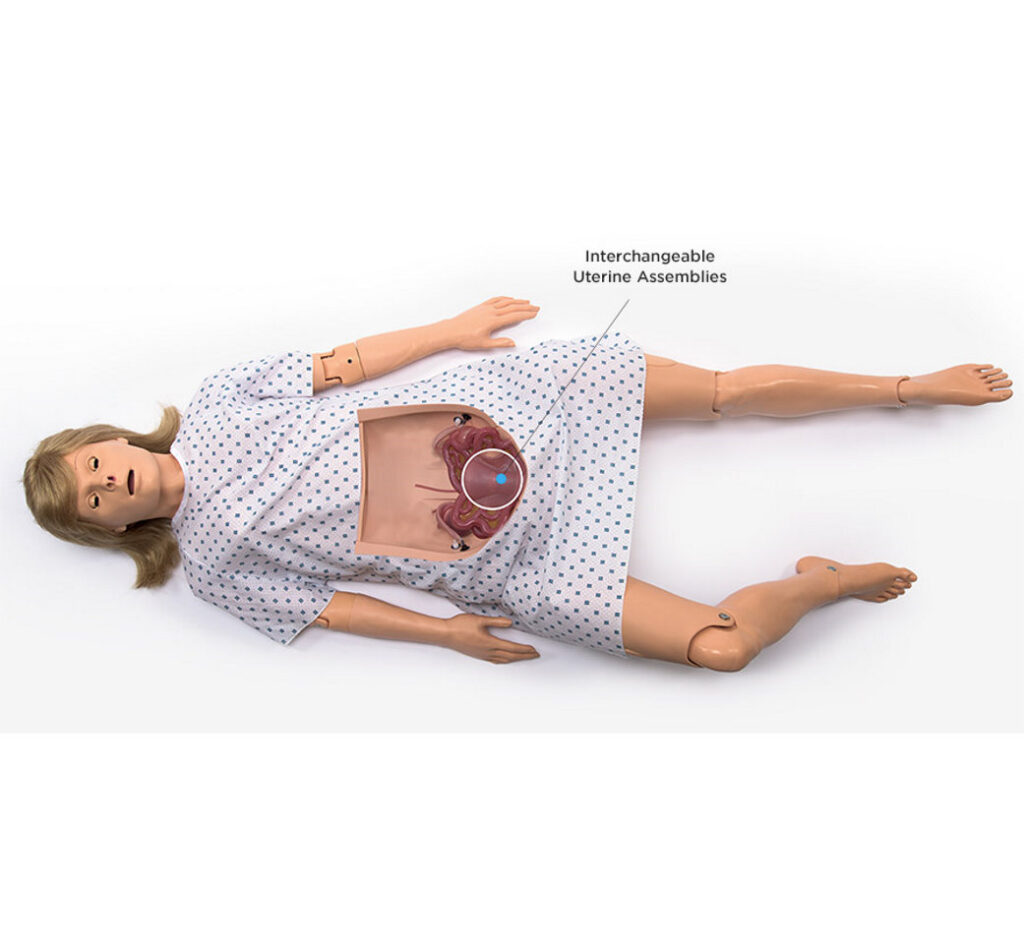General
- Full-body, adult size patient
- Available in light, medium, and dark skin tones
- Built-in wireless connectivity with tablet PC
- Up to 4 hours of tetherless power from internal, rechargeable battery
- Articulating head, jaw, shoulder, knees, and ankles
Neural Responses
- Eyes open and Close Manually
- Wireless streaming audio & prerecorded responses
- Create and store vocal responses in any language
- Instructor can simulate patient’s voice and listen to caregivers’ conversation
Airway
- Multiple upper airway sounds synchronized with breathing
- Perform Bag Valve Mask ventilations
- Anatomically accurate airway including tongue, epiglottis, vocal cords, and esophagus
- Placement of conventional airway adjuncts
- Nasal or oral intubation
- Endotracheal intubation using conventional ETTs
- Place Nasogastric(NG) or Orogastric(OG) tubes
- Sellick Maneuver brings vocal cords into view
Breathing
- Spontaneous breathing and chest rise generated by internal compressor
- Bilateral chest rise and fall
- Programmable rate and depth of respiration
- Normal and abnormal lung sounds synchronized with respiratory pattern and rate
- Artificial ventilation rate and quality detected and logged in UNI® software
Cardiac
- Monitor ECG with real equipment from 4 conductive skin regions
- Normal and abnormal heart sounds may be auscultated and are synchronized with ECG
- Multiple programmable heart sounds, rates, and intensities
- Compressions are automatically detected and logged
- Chest compressions generate palpable pulse and ECG artifacts
Circulation
- Measure blood pressure by palpation or auscultation using real equipment
Palpate radial pulses
Use real cuff rather than “virtual” cuff
Korotkoff sounds audible between Systolic and Diastolic pressures
- Bilateral pulse sites synchronized with BP and Heart Rate
Carotid
Brachial
Radial
- Bilateral Intravenous(IV) arms with fill/drain sites
- Subcutaneous and intramuscular injection sites
- Realistic flashback with proper IV procedure
- Ovarian and Uterine arteries and veins with bleeding functionality
- Vital Signs reflect physiologic changes that occur with hemorrhaging during scenarios
- Oxygen Saturation detected using real monitors rather than a “virtual” value
Surgical Components
Laparotomy Abdominal Wall
- Included Abdominal Insert
Multi-layer design replicates the skin, subcutaneous fat, fascia, muscle, and peritoneum
Use real instruments for incision, dissection, and suturing
Can be used at least four(4) times
Incorporates bleeding
Perform pfannenstiel or vertical incision
- Place laparoscopic trocars
Laparoscopy Abdominal Wall
- Includes eight(8) access ports on left(3), right(3), and midline(2) of abdominal wall
- Place Laparoscopic trocars
Bowel Insert
- Insert that can be placed over uterine assemblies for added realism
- Bowel can be pushed aside using standard techniques to access underlying structures
Uterine Assembly 1
- Normal-sized uterus with ectopic pregnancy and uterine hemorrhage. Simulatres ruptured ectopic pregnancy with bleeding and severe vaginal bleeding from uterus
Uterine Assembly 2
- Enlarged uterus with dermoid cyst and ectopic pregnancy. Simulates ruptured ectopic pregnancy with bleeding and realistic dermoid cyst
Uterine Assembly 3
- Enlarged uterus with embedded fibroids. Simulates Embedded, bleeding fibroids, a simple cyst, and endometrioma
- Additional procedures that are possible on all uterine assemblies include: unilateral oophorectomy, conization of the cervix, chromopertubation, hysteroscopy. Existence of blood vessels allows assessment of surgical knot integrity.
- All uterine assemblies include ovarian and uterine veins and arteries, bladder, ovaries, fallopian tubes, peritoneum, ureters, perineum with integrated vagina, and round, uterosacral, infundibulopelvic, and cardinal ligaments.
Workbook by Martin E. Olsen, MD
- Workbook of ten(10) advanced scenarios and example surgical checklists:
Ruptured ectopic pregnancy
Pelvic Mass is Pregnancy
Septic Abortion
Bleeding Disorder – Von Willebrand’s Disease
Post-operative hemorrhage after conization of the cervix
Fire in the Operating Room
Hypoxia in the Operating Room
Cardiac Arrest in the Operating Room
Anaphylaxis in the Operating Room
Malignant Hyperthermia during surgery
UNI® Simulator Control Software
- Automatically detects and logs actions of participants
- View the actions of up to 6 care providers using a responsive menu or written narrative
- Generate and share lab results
- 11 pre-programmed scenarios which can be modified by the instructor even during the simulation
- Create and edit your own scenarios
- Change the vitals of the simulator on-the-fly with as little as two clicks
Virtual Monitor
- 20” All-in-one touch screen PC to display vitals
- Controlled via wireless, tablet PC
- Use selected configurations or create your own configuration to mimic the real monitors used in your facility
- Share images such as ultrasounds, CT scans, lab results, and patient charts
- Display up to 10 numeric parameters
- Display up to 6 dynamic waveforms
Optional Portable Fusion HD™
- Two (2) wireless cameras
- One (1) wired, mounted camera
- Audio, video and more…
- Up to 8 video and audio streams can be recorded along with 4 patient monitor feeds and a simulator log file
- Advanced search functionality, simultaneous multicomputer access and instant playback
- Integrated Monitor shows “patient” status, views of up to four cameras, operating system, and log of events
- Flexible
- Its compatibility with various wireless and wired cameras together with the ability to shoot multiple simulations simultaneously make the Portable Fusion HD™ the best option for simulations of all types and sizes
